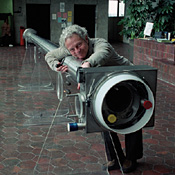Essay: Leon Lederman
 |
Saturday Morning Physics
Back in 1979, I was the new director of Fermilab, wrenched away from 28 years of teaching and research at Columbia. Fermilab was wonderful, filled with experienced and hard-working staff physicists. Achieving a vision for the future -- partly borrowed, partly stolen, partly rented -- was easy. The pay was good, but something was wrong. A group of concerned postdocs diagnosed my anxieties: I wasn't teaching!
Out of this diseased and malignant situation came the cure: Saturday Morning Physics! Early in 1980, the students arrived. We carved the year into three 10-week sessions, we appointed "Joe Smith" (a.k.a. Drasko Jovanovich) as SMP "principal," I gave the introductory lecture, and the world started to get better and better. The only distraction to SMP was the occasional directorial decision: "Should we hire BJ?" Sure! "Should we build a superconducting energy saver/doubler?" Of course! "The Secretary of Energy is calling." Tell him I'm busy... SMP was fun, profitable, and would, given time, surely save the nation.
Just imagine: in 25 years at 300 students per year, we had impact upon -- where is my slide rule? -- 49,276 students. Each 10-week session ended with a mock graduation, a diploma (usually a large picture of me), and a celebration with parents invited. From the parents, we got our most rewarding feedback. These kids brought home their excitement and stimulation. Our lecturers -- mostly Fermilab postdocs -- were, by instruction, light-hearted, and the lectures were based upon subjects related to Fermilab's research. Very often, the younger brothers and sisters of SMP grads took the course. In my travels to universities around the nation, it is rare that I am not accosted by an SMP alum who will greet me with the proud pronouncement, "You probably don't remember me, but I took SMP at Fermilab."
What are the outcomes of this blatant effort to spread the culture of high-energy physics and, of course, of science? Certainly a substantial fraction of SMP alumni were turned on to science discussions by this experience, by meeting real scientists, and by touring the vast, complex machinery of the world's most powerful atom-smasher. This is anecdotal and it would be hard to make it quantitative, but I can assert that very few of our graduates were harmed.
A serious benefit to SMP was its influence on our postdoc teachers. Their experience in lecturing to students had the universal effect of increasing their own understanding via the truism: When you teach, you learn; if you don't learn, you are not teaching properly. Curiously, the inexperience of our postdocs had a positive effect on the SMP students. Here is a 24-year-old postdoc, dressed and coifed just like the high school students. He enters the classroom and announces, "Hey guys, today we will do a little relativity, hey? Okay?" You can see the students looking at each other and thinking, "This is a PhD in physics? It cant be that hard."
Another by-product of SMP was that bringing in so many students, mostly from the affluent suburbs of Chicago, indicated to us that the schools were not nurturing the science-prone students, who were frustrated and often turned off by insensitive and uninformed teaching. This led almost directly -- via a visit by me to Governor James Thompson -- to the creation of the Illinois Math and Science Academy (IMSA), a residential public high school for gifted students. By now, over a dozen such schools exist, defying the silly objections of many parents that collecting and nurturing students gifted in math and science is "elitism," something to be avoided. Curiously, we hear no such objections to collecting the best singers for the opera, the best musicians for orchestras, not to mention the best baseball players for the Chicago Cubs!
SMP has been widely copied all over the world. It costs nothing, everyone profits, and out of the thousands of graduates will surely emerge innovative inventors to spur the economy, a deeper appreciation of how the world works, cures for cancer, heart disease, AIDS, and perhaps, most importantly, cures for ignorance of science.
Leon Lederman received the National Medal of Science in 1965, and the Nobel Prize in Physics in 1988. From 1979 to 1989 he was the director of Fermilab. Lederman is an outspoken advocate for science education, and has served as chairman and president of the American Association for the Advancement of Science. He co-founded the Illinois Mathematics and Science Academy in 1982, and the Teachers Academy of Mathematics and Science in Chicago in 1990 to improve instruction of these subjects in public schools.
Click here to download the pdf version of this article.


